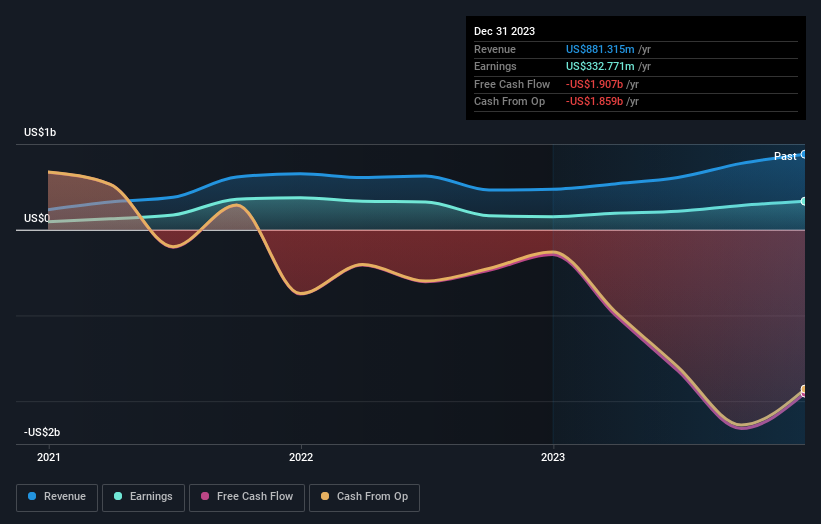Freedom Holding Corp.'s (NASDAQ:FRHC) insiders are still the largest shareholders with 71% stake despite recent sales
Key Insights
Significant insider control over Freedom Holding implies vested interests in company growth
70% of the company is held by a single shareholder (Timur Turlov)
If you want to know who really controls Freedom Holding Corp. (NASDAQ:FRHC), then you'll have to look at the makeup of its share registry. And the group that holds the biggest piece of the pie are individual insiders with 71% ownership. That is, the group stands to benefit the most if the stock rises (or lose the most if there is a downturn).
Insiders own the top position in the company’s share registry despite recent sales and as a result, were the biggest beneficiaries of last week’s 9.4% gain.
In the chart below, we zoom in on the different ownership groups of Freedom Holding.
View our latest analysis for Freedom Holding
What Does The Lack Of Institutional Ownership Tell Us About Freedom Holding?
Institutional investors often avoid companies that are too small, too illiquid or too risky for their tastes. But it's unusual to see larger companies without any institutional investors.
There are multiple explanations for why institutions don't own a stock. The most common is that the company is too small relative to funds under management, so the institution does not bother to look closely at the company. It is also possible that fund managers don't own the stock because they aren't convinced it will perform well. Freedom Holding's earnings and revenue track record (below) may not be compelling to institutional investors -- or they simply might not have looked at the business closely.
Hedge funds don't have many shares in Freedom Holding. With a 70% stake, CEO Timur Turlov is the largest shareholder. This essentially means that they have significant control over the outcome or future of the company, which is why insider ownership is usually looked upon favourably by prospective buyers. Askar Tashtitov is the second largest shareholder owning 0.2% of common stock, and BlackRock, Inc. holds about 0.1% of the company stock. Interestingly, the second-largest shareholder, Askar Tashtitov is also President, again, pointing towards strong insider ownership amongst the company's top shareholders.
While it makes sense to study institutional ownership data for a company, it also makes sense to study analyst sentiments to know which way the wind is blowing. We're not picking up on any analyst coverage of the stock at the moment, so the company is unlikely to be widely held.
Insider Ownership Of Freedom Holding
The definition of an insider can differ slightly between different countries, but members of the board of directors always count. The company management answer to the board and the latter should represent the interests of shareholders. Notably, sometimes top-level managers are on the board themselves.
Most consider insider ownership a positive because it can indicate the board is well aligned with other shareholders. However, on some occasions too much power is concentrated within this group.
Our information suggests that insiders own more than half of Freedom Holding Corp.. This gives them effective control of the company. Insiders own US$3.2b worth of shares in the US$4.5b company. That's extraordinary! It is good to see this level of investment. You can check here to see if those insiders have been selling any of their shares.
General Public Ownership
The general public-- including retail investors -- own 28% stake in the company, and hence can't easily be ignored. While this size of ownership may not be enough to sway a policy decision in their favour, they can still make a collective impact on company policies.
Next Steps:
It's always worth thinking about the different groups who own shares in a company. But to understand Freedom Holding better, we need to consider many other factors.
I always like to check for a history of revenue growth. You can too, by accessing this free chart of historic revenue and earnings in this detailed graph.
If you would prefer check out another company -- one with potentially superior financials -- then do not miss this free list of interesting companies, backed by strong financial data.
NB: Figures in this article are calculated using data from the last twelve months, which refer to the 12-month period ending on the last date of the month the financial statement is dated. This may not be consistent with full year annual report figures.
Have feedback on this article? Concerned about the content? Get in touch with us directly. Alternatively, email editorial-team (at) simplywallst.com.
This article by Simply Wall St is general in nature. We provide commentary based on historical data and analyst forecasts only using an unbiased methodology and our articles are not intended to be financial advice. It does not constitute a recommendation to buy or sell any stock, and does not take account of your objectives, or your financial situation. We aim to bring you long-term focused analysis driven by fundamental data. Note that our analysis may not factor in the latest price-sensitive company announcements or qualitative material. Simply Wall St has no position in any stocks mentioned.

 Yahoo Finance
Yahoo Finance 

